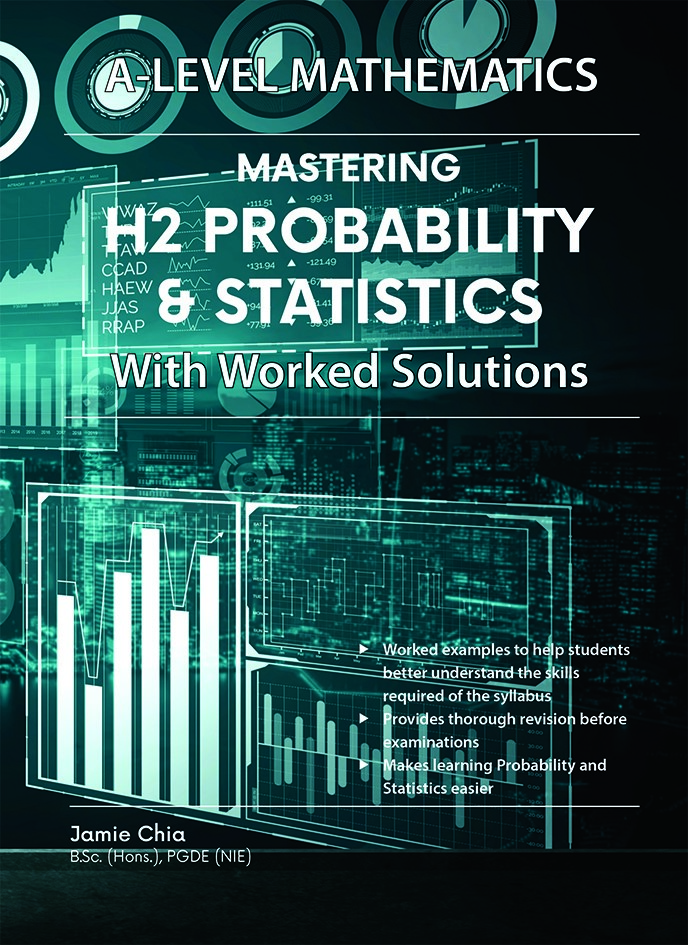Jamie Chia read Mathematics at the National University of Singapore (NUS) and joined the National Institute of Education (NIE) to do her Postgraduate Diploma in Education. She started her teaching career at a junior college and spent several years teaching H2 Mathematics. She believes that mathematical problem solving should be the prominent feature of the complete mathematics learning experiences for all students.
Jamie is the author of Mastering H2 Probability & Statistics With Worked Solutions. This book offers additional practices for students studying A-Level Math. The materials contain worked examples to help students better understand the skills required in the syllabus and provides thorough revision before examinations.
Today, Jamie shares with us on how students can study Probability and Statistics more effectively.
About your book
- How will this book help students to better prepare for examinations?
This book contains fully worked solutions for students preparing for the GCE ‘A’ level examination. While the book is presented in topics, some examination questions may integrate ideas from more than one topic, and topics may also be tested in the contexts of problem solving and application of mathematics.
2. What are some important skills students should master in order to excel in Probability and Statistics?
It is the skill of analysis. Sometimes even a change in a small condition is enough to affect the way we solve the problem. Students must be alert and aware of these changes and how they will change the problem-solving method.
3. Are there any challenging concepts that students find hard to grasp in Probability and Statistics?
Students often tell me that they struggle to differentiate between when it would be appropriate to use Normal Distribution and Binomial Distribution.
4. How can they overcome these challenges?
While it can be difficult to differentiate questions sometimes, this challenge can be countered as students attempt more questions and become more alert to the subtle differences in the wording of the questions. In this case, I hope that the Mastering H2 Probability & Statistics With Worked Solutions book will be able to help students overcome this challenge.
5. What are some common mistakes that students make when they are solving Probability and Statistics questions?
Some common mistakes made by students are in the Permutations and Combinations part of Statistics where they are unsure when to use either.
6. In addition to consistent practice, is there anything else students can do to master these topics?
There are no shortcuts to improving in Mathematics. Students need to practise more and then clarify their doubts immediately with their teachers.
7. Lastly, how would you encourage students who find these topics difficult?
A-Level Mathematics lets the student develop a set of transferrable skills. These include the skill of working with mathematical information; the ability to think logically and independently; to consider accuracy; to model situations mathematically; to analyse results and reflect on findings. Learners can apply these skills across a wide range of subjects and these skills can prepare them well for progression to higher education or directly into employment. Students should appreciate the beauty of Mathematics and with time, Mathematics won’t seem difficult anymore.
About Yourself/Work/Expertise
- Why did you choose to teach Mathematics?
I’ve always loved numbers and Mathematics since young! My secondary school Mathematics teacher was very dedicated and this made me love the subject even more and inspired me to become a teacher like her.
2. What are some of your memorable experiences from teaching Mathematics over the years?
Students can learn without fear if they have a safe place to practise Math and don’t feel insecure or embarrassed to make mistakes. Students who do well in Math are always confident. I once had a student who was always afraid to even attempt questions as he was scared that he would not be able to solve them. This was detrimental to his learning progress. However, with plenty of encouragement, the student started feeling more comfortable with attempting questions and even started consistently scoring well.
3. What are some of the common grouses you have heard from your students regarding Mathematics?
Students complain that Mathematics is tough and boring with no real-life applications. I try to show students the beauty of the subject.
4. In your opinion, how can students stay motivated when faced with challenging Mathematics questions?
Students react with enthusiasm when they are challenged mentally. Great care must be taken in selecting the question. The challenging question must lead into the lesson and be within reach of the students’ abilities.
5. Why should problem solving be the prominent feature in learning Mathematics?
Problem solving helps a student to develop analytical skills. Students will never truly be able to understand the subject with just rote learning. Good analytical skills ensure that students will be able to solve the problem no matter what the question is.
6. What are some important applications of Mathematics?
Mathematics is a basic and important discipline that contributes to the developments and understandings of sciences and other disciplines. It is used by scientists, engineers, business analysts and psychologists, etc. to model, understand and solve problems in their respective fields. A good foundation in Mathematics and the ability to reason mathematically are therefore essential for students to be successful in their pursuit of various disciplines.
7. Do you have any other advice for students as they study Mathematics?
While many students may develop procedural fluency, they might often lack the deep conceptual understanding necessary to solve new problems or to make connections between mathematical ideas. Hence, while practising Math questions, students should remember that understanding the concepts behind the questions is just as, if not more, important than knowing how to solve them.

